小升初专题复习---动词第三人称单数 课件(共21张PPT)
文档属性
| 名称 | 小升初专题复习---动词第三人称单数 课件(共21张PPT) |  | |
| 格式 | zip | ||
| 文件大小 | 2.7MB | ||
| 资源类型 | 教案 | ||
| 版本资源 | 通用版 | ||
| 科目 | 英语 | ||
| 更新时间 | 2023-05-08 18:38:22 | ||
图片预览

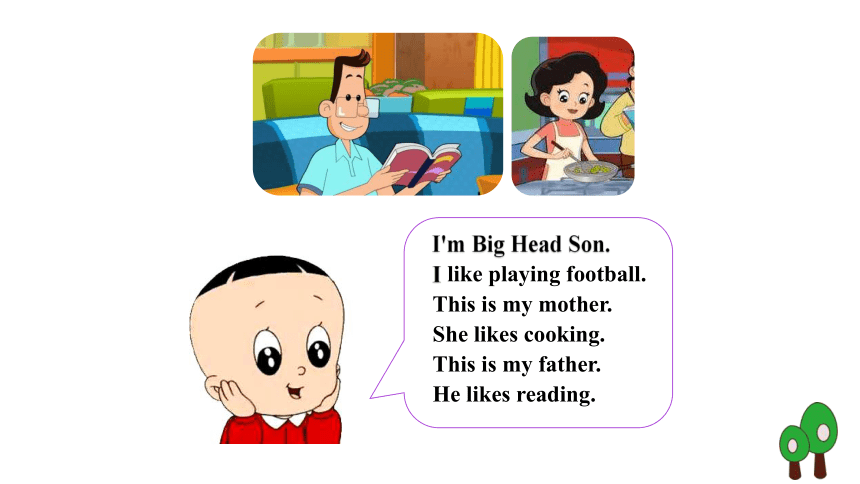
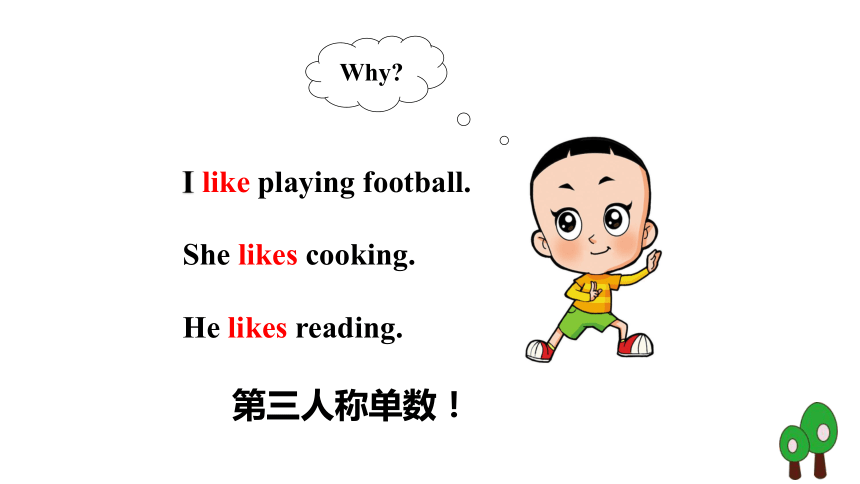
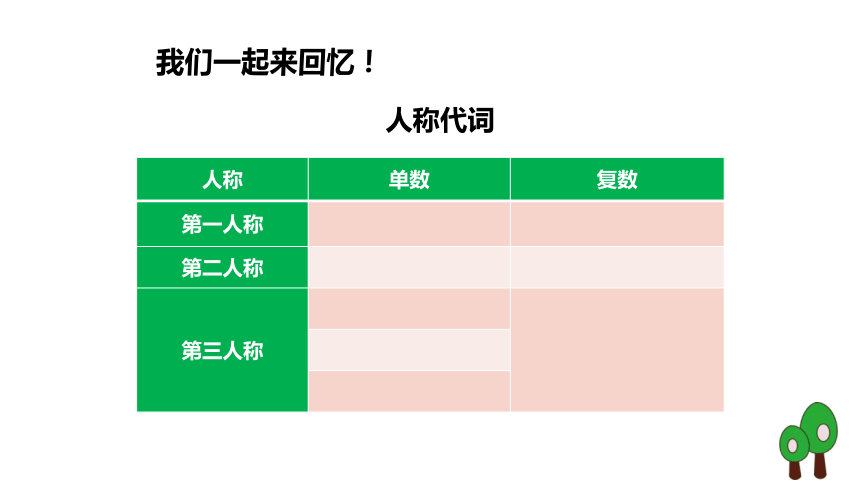
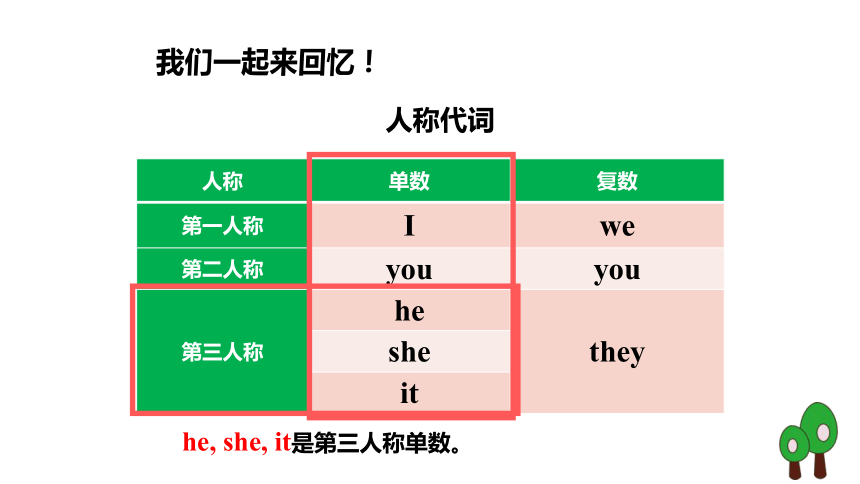
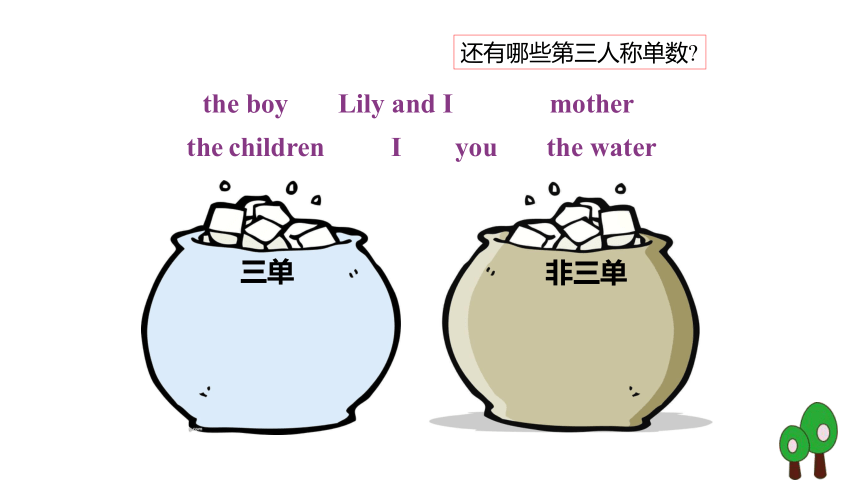
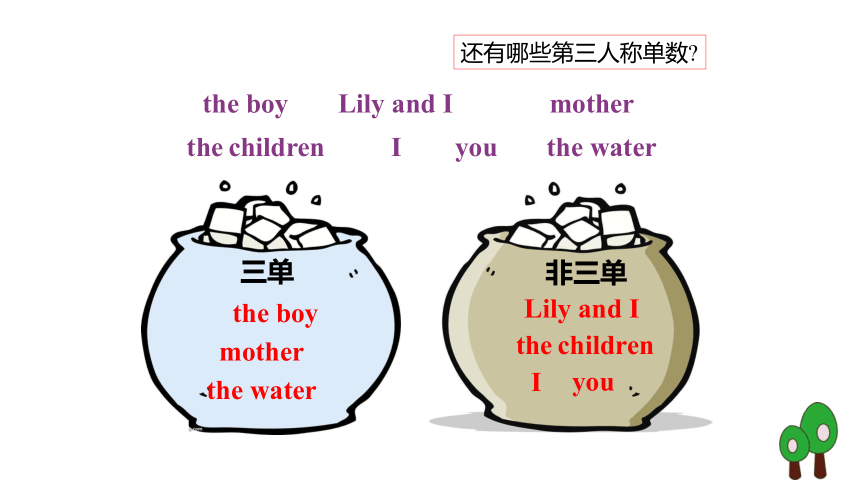
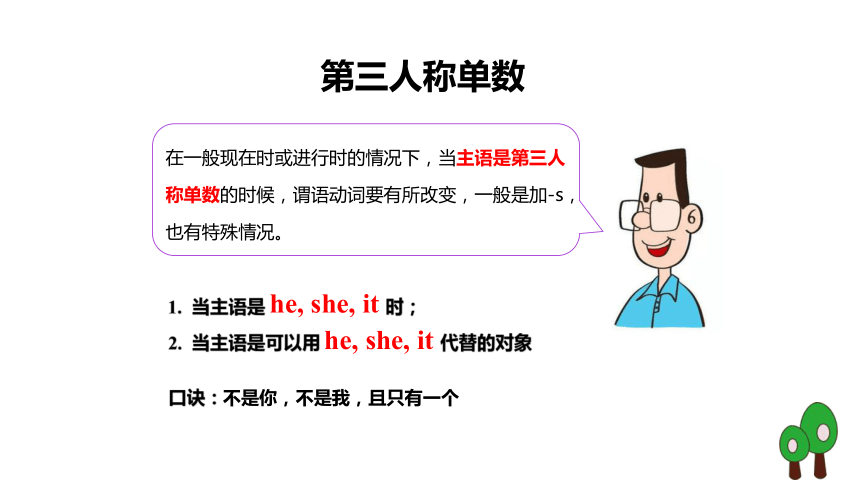
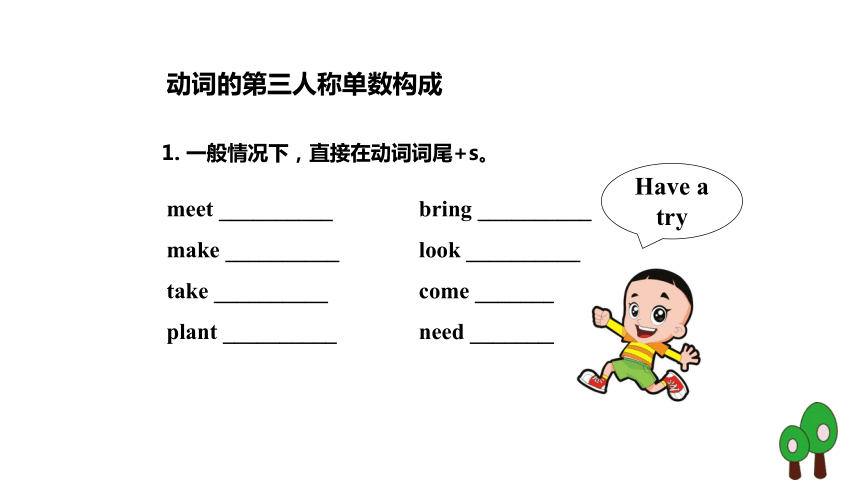
文档简介
(共21张PPT)
动词第三人称单数
I'm Big Head Son.
I like playing football.
This is my mother.
She likes cooking.
This is my father.
He likes reading.
I like playing football.
She likes cooking.
He likes reading.
Why
第三人称单数!
人称 单数 复数
第一人称
第二人称
第三人称
人称代词
我们一起来回忆!
人称 单数 复数
第一人称 I we
第二人称 you you
第三人称 he they
she it
he, she, it是第三人称单数。
人称代词
我们一起来回忆!
非三单
三单
the boy
Lily and I
mother
the children
the water
I
you
还有哪些第三人称单数
非三单
三单
the boy
Lily and I
mother
the children
the water
I
the boy
Lily and I
mother
the children
the water
I
you
you
还有哪些第三人称单数
在一般现在时或进行时的情况下,当主语是第三人称单数的时候,谓语动词要有所改变,一般是加-s,也有特殊情况。
第三人称单数
当主语是 he, she, it 时;
当主语是可以用 he, she, it 代替的对象
口诀:不是你,不是我,且只有一个
动词的第三人称单数构成
1. 一般情况下,直接在动词词尾+s。
meet __________ bring __________
make __________ look __________
take __________ come __________
plant __________ need __________
Have a try
动词的第三人称单数构成
2. 以s, sh, ch, x, o 结尾的动词,在词尾+ 加es。
teach __________ fish __________
go __________ do__________
fix __________ watch __________
Have a try
动词的第三人称单数构成
3. 以辅音字母+ y 结尾的动词,变y 为i,再加es。
study__________ fly __________
try__________ carry__________
cry __________ hurry __________
Have a try
动词的第三人称单数构成
4. 特殊情况:动词 have ,遇到主语是第三人称单数时,要用 has。
brush__________ go__________
stay__________ make__________
have__________ come __________
fly__________ teach __________
Have a try
用括号内动词的适当形式填空。
1.She _______(go) to school from Monday to Friday.
2.Liu Tao _______(do) not like PE.
3.The child often _______(watch) TV in the evening.
4.Su Hai and Su Yang _______(have) eight lessons this term.
5. He________ TV every evening. (watch)
6.John ________ like his father. (look)
用括号内动词的适当形式填空。
1.She _______(go) to school from Monday to Friday.
2.Liu Tao _______(do) not like PE.
3.The child often _______(watch) TV in the evening.
4.Su Hai and Su Yang _______(have) eight lessons this term.
5. He________ TV every evening. (watch)
6.John ________ like his father. (look)
goes
does
watches
have
watches
looks
I don't like doing my homework.
My mother doesn't like that.
含有动词第三人称单数形式的句子变否定句时,要用 doesn't + 动词原形。
Does my mother like singing
Of course she likes it!
对含有动词第三人称单数形式的句子提问时,要用助动词 does.
句型转换
1. I go to school by bus. (用He做主语)
______________________________________
2. Kim plays baseball very well. (变一般疑问句)______________________________________
3. She plays sports every day. (变否定句)
______________________________________
4. David doesn't like French. (变肯定句)______________________________________
句型转换
1. I go to school by bus. (用He做主语)
______________________________________
2. Kim plays baseball very well. (变一般疑问句)______________________________________
3. She plays sports every day. (变否定句)
______________________________________
4. David doesn't like French. (变肯定句)______________________________________
He goes to school by bus.
Does Kim play baseball very well?
She doesn't play sports every day.
David likes French.
总 结
一、动词变化规律。
二、否定句。
三、疑问句。
总 结
一、动词变化规律。
1. 一般情况下,直接在动词词尾+s。
2.以s, sh, ch, x, o 结尾的动词,在词尾+ 加es。
3. 以辅音字母+ y 结尾的动词,变y 为i,再加es。
4. 特殊情况:动词 have ,遇到主语是第三人称单数时,要用 has。
二、否定句。
含有动词第三人称单数形式的句子变否定句时,要用 doesn't + 动词原形。
三、疑问句。
对含有动词第三人称单数形式的句子提问时,要用助动词 does。
课后作业
用所给单词的适当形式填空
I usually ____ (go) running for half an hour at the weekend.
2. My mom ______ (like) watching TV.
3. This ___(be) my cat. It ____(love) me.
4. ____ (be) your sister a member of the Reading Club
5. She often _____ (finish) her homework at 9:00.
6. Cats like _____ (eat) fish.
7. We ________ (not have) a Music lesson.
8. His uncle __________ (not get) up early everyday.
动词第三人称单数
I'm Big Head Son.
I like playing football.
This is my mother.
She likes cooking.
This is my father.
He likes reading.
I like playing football.
She likes cooking.
He likes reading.
Why
第三人称单数!
人称 单数 复数
第一人称
第二人称
第三人称
人称代词
我们一起来回忆!
人称 单数 复数
第一人称 I we
第二人称 you you
第三人称 he they
she it
he, she, it是第三人称单数。
人称代词
我们一起来回忆!
非三单
三单
the boy
Lily and I
mother
the children
the water
I
you
还有哪些第三人称单数
非三单
三单
the boy
Lily and I
mother
the children
the water
I
the boy
Lily and I
mother
the children
the water
I
you
you
还有哪些第三人称单数
在一般现在时或进行时的情况下,当主语是第三人称单数的时候,谓语动词要有所改变,一般是加-s,也有特殊情况。
第三人称单数
当主语是 he, she, it 时;
当主语是可以用 he, she, it 代替的对象
口诀:不是你,不是我,且只有一个
动词的第三人称单数构成
1. 一般情况下,直接在动词词尾+s。
meet __________ bring __________
make __________ look __________
take __________ come __________
plant __________ need __________
Have a try
动词的第三人称单数构成
2. 以s, sh, ch, x, o 结尾的动词,在词尾+ 加es。
teach __________ fish __________
go __________ do__________
fix __________ watch __________
Have a try
动词的第三人称单数构成
3. 以辅音字母+ y 结尾的动词,变y 为i,再加es。
study__________ fly __________
try__________ carry__________
cry __________ hurry __________
Have a try
动词的第三人称单数构成
4. 特殊情况:动词 have ,遇到主语是第三人称单数时,要用 has。
brush__________ go__________
stay__________ make__________
have__________ come __________
fly__________ teach __________
Have a try
用括号内动词的适当形式填空。
1.She _______(go) to school from Monday to Friday.
2.Liu Tao _______(do) not like PE.
3.The child often _______(watch) TV in the evening.
4.Su Hai and Su Yang _______(have) eight lessons this term.
5. He________ TV every evening. (watch)
6.John ________ like his father. (look)
用括号内动词的适当形式填空。
1.She _______(go) to school from Monday to Friday.
2.Liu Tao _______(do) not like PE.
3.The child often _______(watch) TV in the evening.
4.Su Hai and Su Yang _______(have) eight lessons this term.
5. He________ TV every evening. (watch)
6.John ________ like his father. (look)
goes
does
watches
have
watches
looks
I don't like doing my homework.
My mother doesn't like that.
含有动词第三人称单数形式的句子变否定句时,要用 doesn't + 动词原形。
Does my mother like singing
Of course she likes it!
对含有动词第三人称单数形式的句子提问时,要用助动词 does.
句型转换
1. I go to school by bus. (用He做主语)
______________________________________
2. Kim plays baseball very well. (变一般疑问句)______________________________________
3. She plays sports every day. (变否定句)
______________________________________
4. David doesn't like French. (变肯定句)______________________________________
句型转换
1. I go to school by bus. (用He做主语)
______________________________________
2. Kim plays baseball very well. (变一般疑问句)______________________________________
3. She plays sports every day. (变否定句)
______________________________________
4. David doesn't like French. (变肯定句)______________________________________
He goes to school by bus.
Does Kim play baseball very well?
She doesn't play sports every day.
David likes French.
总 结
一、动词变化规律。
二、否定句。
三、疑问句。
总 结
一、动词变化规律。
1. 一般情况下,直接在动词词尾+s。
2.以s, sh, ch, x, o 结尾的动词,在词尾+ 加es。
3. 以辅音字母+ y 结尾的动词,变y 为i,再加es。
4. 特殊情况:动词 have ,遇到主语是第三人称单数时,要用 has。
二、否定句。
含有动词第三人称单数形式的句子变否定句时,要用 doesn't + 动词原形。
三、疑问句。
对含有动词第三人称单数形式的句子提问时,要用助动词 does。
课后作业
用所给单词的适当形式填空
I usually ____ (go) running for half an hour at the weekend.
2. My mom ______ (like) watching TV.
3. This ___(be) my cat. It ____(love) me.
4. ____ (be) your sister a member of the Reading Club
5. She often _____ (finish) her homework at 9:00.
6. Cats like _____ (eat) fish.
7. We ________ (not have) a Music lesson.
8. His uncle __________ (not get) up early everyday.
